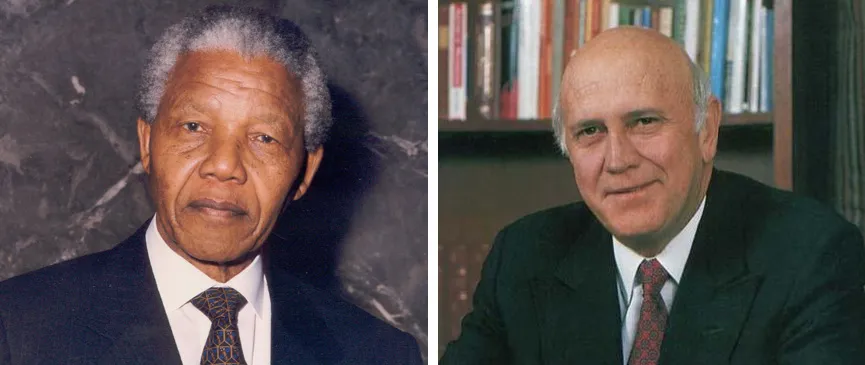Main content
Frederick W. de Klerk and Nelson Mandela Prince of Asturias Award for International Cooperation 1992

The work of Frederick Willem de Klerk and Nelson R. Mandela has contributed to peace and development in South Africa.
Frederik Willem de Klerk (Johannesburg, South Africa, 1936 - Fresnaye, Cape Town, South Africa, 2021) graduated in Law in 1958. He subsequently started working for a law firm in Vereeniging but soon became involved in political activities. Elected Member of Parliament for Vereeniging in 1972, six years later he became a member of the Cabinet, subsequently holding a succession of ministerial posts. On 1st July 1985, he was appointed president of the Council of Ministers of the Assembly and, on 1st December 1986, head of the Assembly. On 15th September 1989, he was appointed President of South Africa, succeeding Pieter Botha. Recognized for releasing Nelson Mandela from prison and jointly helping to end apartheid, for which he was awarded the Nobel Peace Prize in 1993, he retired from politics in 1997 after having also served as vice president of the government (1994 -1996) during Mandela’s presidency.
He published his autobiography The Last Trek: A New Beginning in 2000.
In 2004, he created the Global Leadership Foundation, an institution for the promotion of peace, democracy and development.
Nelson Rolihlahla Mandela (Mvezo, South African Union, 1918 - Johannesburg, Gauteng, South Africa, 2013) was an activist against apartheid, politician and president of South Africa in the period from 1994 to 1999. Son of a chief of the Thembu royal family, he began studying Law at the University of Fort Hare, where he was expelled for promoting a student strike in 1940, which meant he had to continue his studies at the University of the Witwatersrand.
A member of the African National Congress (ANC) since 1944, in 1952 he directed the Defiance Campaign, after which he was banned from holding official positions in the ANC or taking part in assemblies until 1958. In 1962, he was sentenced to five years' imprisonment for incitement to strike and leaving South Africa illegally. Two years later he was sentenced to life imprisonment for conspiracy and incitement to violent revolution.
After being freed on the 11th February 1990, Nelson Mandela was appointed National President of the ANC. Since then he has received numerous prizes and has been made a doctor honoris causa of many different universities throughout the world, including the Complutense University of Madrid and the University of Seville.
He was released during De Klerk’s mandate, both of whom worked –from different positions, but through negotiation– to achieve the major reforms that allowed South Africa to put an end to the policy of apartheid, or racial segregation of whites and blacks, which assigned all the privileges to the former. For this work, Mandela and De Klerk shared the Nobel Peace Prize in 1993.
In May 1994, following the first general elections in which all racial groups (including blacks) had the right to vote, Mandela became the first black president of the Republic of South Africa. The new South African Constitution was signed in December 1996. A year earlier, Mandela had created the Nelson Mandela Fund for Children. During these years, he became a fundamental mediator in the numerous conflicts that plagued the African continent. He formally retired from politics in 1999, being succeeded in the presidency by Thabo Mbeki. From then on, he dedicated all his work to different humanitarian causes via the Nelson Mandela Foundation.
He wrote the autobiographical books The Struggle Is My Life (1988) and Long Walk to Freedom (1995).
End of main content
